Chinese Family Education 中国的家庭教育
中国式教育的利与弊
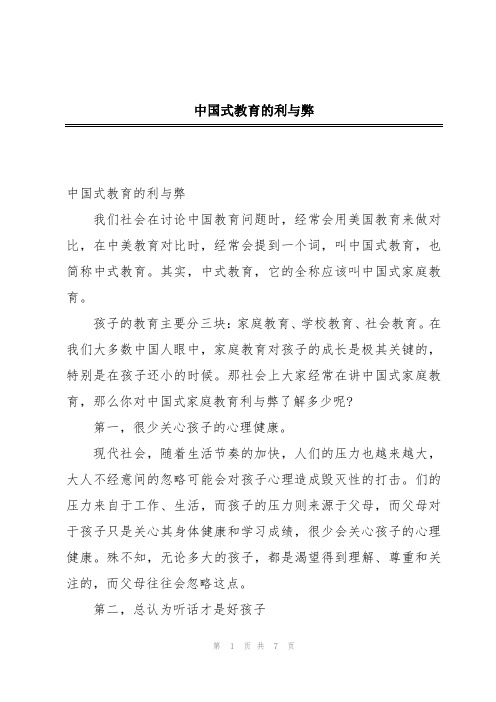
中国式教育的利与弊中国式教育的利与弊我们社会在讨论中国教育问题时,经常会用美国教育来做对比,在中美教育对比时,经常会提到一个词,叫中国式教育,也简称中式教育。
其实,中式教育,它的全称应该叫中国式家庭教育。
孩子的教育主要分三块:家庭教育、学校教育、社会教育。
在我们大多数中国人眼中,家庭教育对孩子的成长是极其关键的,特别是在孩子还小的时候。
那社会上大家经常在讲中国式家庭教育,那么你对中国式家庭教育利与弊了解多少呢?第一,很少关心孩子的心理健康。
现代社会,随着生活节奏的加快,人们的压力也越来越大,大人不经意间的忽略可能会对孩子心理造成毁灭性的打击。
们的压力来自于工作、生活,而孩子的压力则来源于父母,而父母对于孩子只是关心其身体健康和学习成绩,很少会关心孩子的心理健康。
殊不知,无论多大的孩子,都是渴望得到理解、尊重和关注的,而父母往往会忽略这点。
第二,总认为听话才是好孩子如果问:什么样的孩子才是好孩子?相信绝大部分的父母都会说:听话的孩子才是好孩子。
听话在不自觉间变成了评判好孩子的最高标准。
事实上,每个孩子都有自己不同的性格特点,有的孩子生性活泼,有的孩子天生文静、乖巧。
如果父母一味对待,很有可能就扼杀了孩子独有的个性和探索能力。
如果家长真想让孩子听话,那就要自己学习一些如何教育孩子的知识,不仅要懂得孩子的心理成长期,还要了解孩子的胜利成长期;孩子在不同时期的不同心理特征和生理特征等等。
这样才能了解孩子的能力世界,让孩子听话。
其实,中国式家庭教育虽然有很多弊端,但他不是一点利也没有,我们来说一说他的优点有哪些吧!一、棍棒底下出人才首先,棍棒底下出人才并不是说父母无故殴打孩子,而是说当他做了一些事或者犯了一些严重的错误时候,这个时候需给他教训也就是我们常说的给他长个记性,个人认为小孩子不会记住什么事情,如果你心平气和地跟他谈,又或者不管不问,那么会不会助长这种行为,而导致他长大后去社会上被别人狠狠教育。
有很多孩子,喜欢欺负别人,那么这样等他长大以后会不会因为这个而去打架斗殴,又会不会导致伤残,这样带来的就是一个家庭的毁灭。
浅谈中国式的家庭教育

浅谈中国式的家庭教育中国式的家庭教育,大都是望子成龙,望女成凤。
但现在的年青父母们,却忽略了自己教育孩子的一些坏习惯,下面我们就一起来慢慢做剖析,如果你没中一条,那就都算是好父母。
许多父母都希望把孩子送去最好的学校,接受最好的教育,拼尽全力给孩子创造最好的教育环境。
但是却往往忽略了父母才是孩子最好的老师。
父母的一言一行,都是在给孩子做榜样;家庭生活里的每个细节,其实都不是小节。
很多时候,父母为了保护孩子,避免孩子受伤,会做出许多越矩的行为。
殊不知,这样的行为对孩子的成长已经造成了伤害。
许多父母自己勤俭节约,孩子大手大脚。
做父母的自己生活节衣缩食,却无条件满足孩子的要求。
你以为这是爱孩子的表现,其实不然。
在金钱上放纵孩子,很有可能会让他们学会奢侈,不懂得回报,不懂得如何管理金钱。
爱孩子并不意味着要给他们最昂贵的,最重要的是合适。
从小教会孩子理财,懂得感恩和回报,真正了解节俭的道理,才是给孩子最好的礼物。
父母没有礼貌,孩子有样学样。
懂文明,讲礼貌是做人最基本的原则。
生活中,做父母的和别人相处时,如果经常有不礼貌的表现,孩子就会有样学样。
比如父母之间用词不礼貌,孩子对双方也会不礼貌,父母对长辈不礼貌,孩子看在眼里也会学着父母的对待方式。
一旦孩子养成了没礼貌的习惯,就会影响他在人际关系、在学业、事业上面的发展,让他们错失许多机会。
平日里,父母要审视自身的言行,做一个讲文明,讲礼貌的人,言传与身教是不可分割的两个部分看电视节目不分级,孩子易学坏。
做家长的和孩子一起看电视,这个场景几乎每个家庭都会出现。
为了图省事,很多家长会带着孩子一起看成人节目,却忽略了一个问题。
很多成人节目并不适合孩子,有些节目容易让孩子产生错误的认知,而且孩子的眼部发育尚未完全,和家长一起长时间看电视,辐射、强烈视觉和听觉刺激也会伤害到孩子,还有可能造成颈椎等骨骼发育。
我们要意识到,给孩子看节目或者玩电脑,一定要遵循孩子的发展习惯。
保证孩子接触到的内容是正面的、健康的。
中美家庭教育的比较
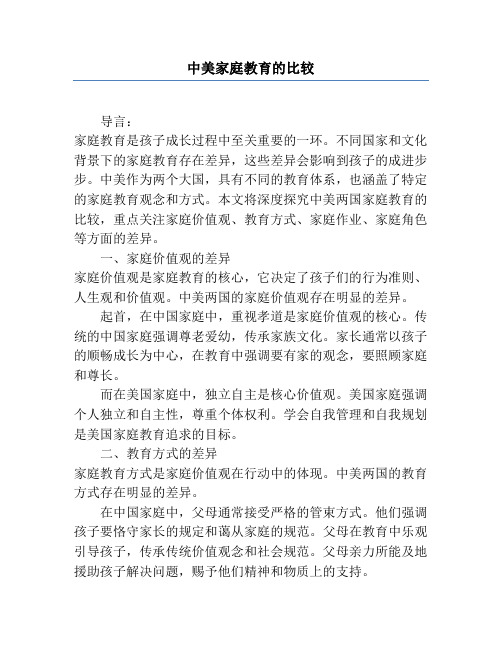
中美家庭教育的比较导言:家庭教育是孩子成长过程中至关重要的一环。
不同国家和文化背景下的家庭教育存在差异,这些差异会影响到孩子的成进步步。
中美作为两个大国,具有不同的教育体系,也涵盖了特定的家庭教育观念和方式。
本文将深度探究中美两国家庭教育的比较,重点关注家庭价值观、教育方式、家庭作业、家庭角色等方面的差异。
一、家庭价值观的差异家庭价值观是家庭教育的核心,它决定了孩子们的行为准则、人生观和价值观。
中美两国的家庭价值观存在明显的差异。
起首,在中国家庭中,重视孝道是家庭价值观的核心。
传统的中国家庭强调尊老爱幼,传承家族文化。
家长通常以孩子的顺畅成长为中心,在教育中强调要有家的观念,要照顾家庭和尊长。
而在美国家庭中,独立自主是核心价值观。
美国家庭强调个人独立和自主性,尊重个体权利。
学会自我管理和自我规划是美国家庭教育追求的目标。
二、教育方式的差异家庭教育方式是家庭价值观在行动中的体现。
中美两国的教育方式存在明显的差异。
在中国家庭中,父母通常接受严格的管束方式。
他们强调孩子要恪守家长的规定和蔼从家庭的规范。
父母在教育中乐观引导孩子,传承传统价值观念和社会规范。
父母亲力所能及地援助孩子解决问题,赐予他们精神和物质上的支持。
而在美国家庭中,父母更倾向于接受开放的教育方式。
他们重视培育孩子的创设力和自主性,鼓舞孩子表达自己的观点和理念。
美国父母更重视孩子与外界的互动,鼓舞他们探究和发现。
而在解决问题时,美国父母更倾向于接受引导和启发的方式,让孩子自己去沉思和解决。
三、家庭作业的差异家庭作业是同砚与家庭教育的重要环节,中美两国的家庭作业也存在差异。
在中国,家庭作业被看作是与学校教育紧密结合的一部分。
家长通常在孩子回家后打算一定的时间和场地给孩子完成作业。
他们会监督孩子的进修进展,援助他们解决进修中遇到的问题。
在中国,家长普遍认为孩子的进修效果是家庭荣誉感的体现,因此家庭作业被视为家庭教育的重要组成部分。
而在美国,家庭作业的重要性相对较低。
中美家庭教育的差异
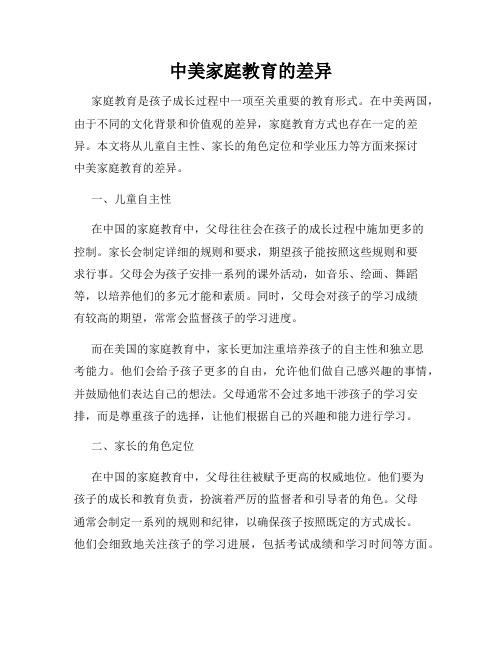
中美家庭教育的差异家庭教育是孩子成长过程中一项至关重要的教育形式。
在中美两国,由于不同的文化背景和价值观的差异,家庭教育方式也存在一定的差异。
本文将从儿童自主性、家长的角色定位和学业压力等方面来探讨中美家庭教育的差异。
一、儿童自主性在中国的家庭教育中,父母往往会在孩子的成长过程中施加更多的控制。
家长会制定详细的规则和要求,期望孩子能按照这些规则和要求行事。
父母会为孩子安排一系列的课外活动,如音乐、绘画、舞蹈等,以培养他们的多元才能和素质。
同时,父母会对孩子的学习成绩有较高的期望,常常会监督孩子的学习进度。
而在美国的家庭教育中,家长更加注重培养孩子的自主性和独立思考能力。
他们会给予孩子更多的自由,允许他们做自己感兴趣的事情,并鼓励他们表达自己的想法。
父母通常不会过多地干涉孩子的学习安排,而是尊重孩子的选择,让他们根据自己的兴趣和能力进行学习。
二、家长的角色定位在中国的家庭教育中,父母往往被赋予更高的权威地位。
他们要为孩子的成长和教育负责,扮演着严厉的监督者和引导者的角色。
父母通常会制定一系列的规则和纪律,以确保孩子按照既定的方式成长。
他们会细致地关注孩子的学习进展,包括考试成绩和学习时间等方面。
父母会对孩子的学习情况进行频繁地考察和问询,以便及时发现和解决问题。
而在美国的家庭教育中,父母更多地扮演着孩子的伙伴和支持者的角色。
他们鼓励孩子独立思考,并尊重他们的意见和决策。
父母与孩子保持开放的沟通,了解孩子的需求和困惑,给予他们帮助和指导。
父母通常对孩子的成绩和学习进展持更加宽容和开放的态度,注重培养孩子的创造力和问题解决能力。
三、学业压力在中国的家庭教育中,学业成绩常常被视为孩子未来发展的关键。
父母会投入大量的时间和精力来监督和辅导孩子的学习,以确保他们能够取得好成绩。
在中国的一些城市,孩子们通常要接受较长时间的教育,学习专业课程和考试。
这种高强度的学习环境使得中国的学生面临着巨大的学业压力,有时会导致他们的身心健康问题。
国内家庭教育现状英语作文
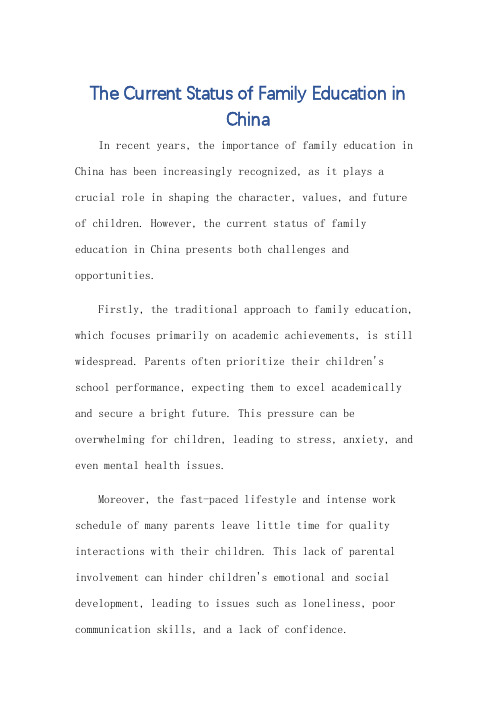
The Current Status of Family Education inChinaIn recent years, the importance of family education in China has been increasingly recognized, as it plays a crucial role in shaping the character, values, and future of children. However, the current status of family education in China presents both challenges and opportunities.Firstly, the traditional approach to family education, which focuses primarily on academic achievements, is still widespread. Parents often prioritize their children's school performance, expecting them to excel academically and secure a bright future. This pressure can be overwhelming for children, leading to stress, anxiety, and even mental health issues.Moreover, the fast-paced lifestyle and intense work schedule of many parents leave little time for quality interactions with their children. This lack of parental involvement can hinder children's emotional and social development, leading to issues such as loneliness, poor communication skills, and a lack of confidence.Despite these challenges, there are also signs of positive change. More and more parents are beginning to recognize the importance of a balanced approach to family education. They are emphasizing the development of their children's character, values, and life skills alongside academic achievements.Parents are also becoming more aware of the need for emotional support and companionship. They are making an effort to spend more quality time with their children, listening to their thoughts and feelings, and providing emotional support and encouragement.In addition, there is a growing trend towards collaborative family education. Parents are realizing that they cannot educate their children alone. They are seeking partnerships with schools, communities, and other parents to provide a comprehensive and holistic education for their children.In conclusion, the current status of family educationin China presents both challenges and opportunities. While the traditional focus on academic achievements and lack of parental involvement remain issues, there is a growingrecognition of the need for a balanced and comprehensive approach to family education. With more parents realizing the importance of emotional support, companionship, and collaboration, the future of family education in China looks promising.**中国家庭教育的现状**近年来,中国家庭教育的重要性日益得到认可,因为它在塑造孩子的性格、价值观和未来方面起着至关重要的作用。
《2024年基于文化视角的中美家庭教育比较研究》范文

《基于文化视角的中美家庭教育比较研究》篇一一、引言家庭教育是每个国家、每个文化的重要组成部分,对于个体成长和社会发展具有深远影响。
本文以中美两国为例,从文化视角出发,对两国的家庭教育进行深入的比较研究。
通过对家庭教育的观念、方式、环境等因素的对比分析,以期为家庭教育的发展提供参考。
二、中美家庭教育观念的差异1. 中国家庭教育的观念中国文化注重家庭观念,强调家庭和睦、尊老爱幼。
因此,中国家庭教育的观念主要体现在培养孩子的道德品质、责任感和家庭观念等方面。
家长通常以言传身教的方式,将传统文化和价值观传递给下一代。
2. 美国家庭教育的观念与中国文化不同,美国文化更加强调个人主义和自由。
因此,美国家庭教育的观念主要体现在培养孩子的独立性、创造力和批判性思维等方面。
家长通常通过鼓励孩子探索、尝试和实践,来培养他们的自信心和自主能力。
三、中美家庭教育方式的差异1. 中国家庭教育的方式中国家庭通常采用严厉与慈爱相结合的教育方式,重视孩子的学业成绩和品行修养。
家长在教育过程中强调纪律性,通过规范行为和惩罚机制来培养孩子的道德观念和自律能力。
此外,中国家长还非常重视孩子的情感沟通,关心孩子的内心世界。
2. 美国家庭教育的方式美国家庭通常采用鼓励与支持的教育方式,注重培养孩子的自信心和自主能力。
家长在教育过程中更加强调平等、尊重和信任,通过与孩子进行开放式的沟通,鼓励他们表达自己的想法和感受。
此外,美国家长还非常重视培养孩子的实践能力,鼓励他们参与各种社会活动和体育运动。
四、中美家庭教育环境的差异1. 中国家庭教育环境中国家庭教育环境受到传统文化和现代生活方式的双重影响。
在家庭教育中,家长通常承担着重要的角色,为孩子提供学习资源、生活保障和心理支持。
此外,学校、社区等社会资源也为家庭教育提供了有力的支持。
2. 美国家庭教育环境美国家庭教育环境更加开放和多元。
家庭、学校、社区等社会资源相互支持,共同为孩子的成长提供良好的环境。
Unit 7 中国式家庭教育与国外家庭教育的区别
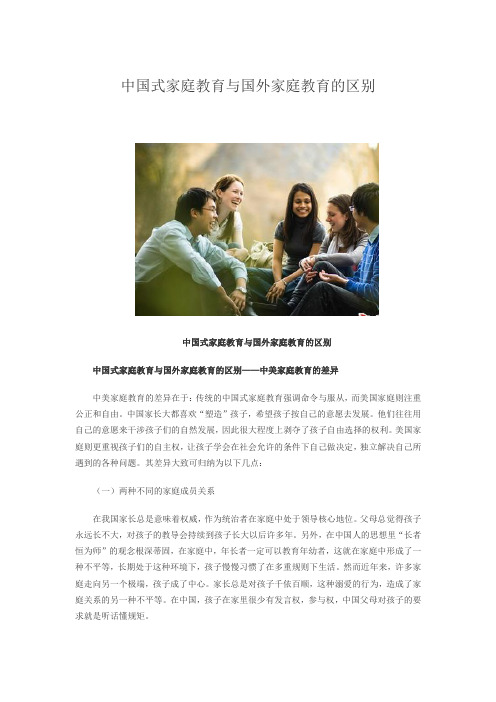
中国式家庭教育与国外家庭教育的区别中国式家庭教育与国外家庭教育的区别中国式家庭教育与国外家庭教育的区别——中美家庭教育的差异中美家庭教育的差异在于:传统的中国式家庭教育强调命令与服从,而美国家庭则注重公正和自由。
中国家长大都喜欢“塑造”孩子,希望孩子按自己的意愿去发展。
他们往往用自己的意愿来干涉孩子们的自然发展,因此很大程度上剥夺了孩子自由选择的权利。
美国家庭则更重视孩子们的自主权,让孩子学会在社会允许的条件下自己做决定,独立解决自己所遇到的各种问题。
其差异大致可归纳为以下几点:(一)两种不同的家庭成员关系在我国家长总是意味着权威,作为统治者在家庭中处于领导核心地位。
父母总觉得孩子永远长不大,对孩子的教导会持续到孩子长大以后许多年。
另外,在中国人的思想里“长者恒为师”的观念根深蒂固,在家庭中,年长者一定可以教育年幼者,这就在家庭中形成了一种不平等,长期处于这种环境下,孩子慢慢习惯了在多重规则下生活。
然而近年来,许多家庭走向另一个极端,孩子成了中心。
家长总是对孩子千依百顺,这种溺爱的行为,造成了家庭关系的另一种不平等。
在中国,孩子在家里很少有发言权,参与权,中国父母对孩子的要求就是听话懂规矩。
美国家长更注重与孩子自由平等的相处。
在孩子小时候就尊重他,重视给孩子个人自主权,让孩子学会在社会允许的条件下自己做决定,独立解决自己所遇到的各种问题。
他们把孩子看做独立个体平等对待,给孩子尊重和理解。
让孩子在家里有发言权、参与权,美国父母鼓励孩子有独立的合理思想;美国孩子有选择权,美国父母在孩子的有了初步的认知能力时,就很重视让孩子自己去进行选择,作出决定,他们可以选择自己喜欢的音乐,图书,游戏,长大以后自己选择朋友,自己选择职业、自己选择婚姻对象等等。
美国父母大多不会替孩子选择,他们主要是引导孩子怎样进行选择,或者站在孩子的身后,给孩子信心,鼓励孩子。
所以,孩子有独立的时间和空间去自由的想像或进行创造性活动(二)两种不同的育儿观中国家庭很重视孩子将来是否有出息,能否找个好工作。
国内家庭教育现状英语作文

国内家庭教育现状英语作文全文共3篇示例,供读者参考篇1The Current Situation of Domestic Family Education in ChinaIntroductionFamily education plays a crucial role in shaping the growth and development of children. In China, traditional family values have always placed a strong emphasis on education, and parents are seen as the primary educators for their children. However, with the rapid changes in society and the increasing pressures faced by families, the landscape of domestic family education in China is constantly evolving. This article aims to explore the current situation of domestic family education in China, highlighting both the strengths and challenges faced by families in this aspect.The Strengths of Domestic Family EducationOne of the key strengths of domestic family education in China is the strong emphasis placed on academic achievement. Chinese parents are known for their high expectations of their children's academic performance and are willing to investsignificant time and resources in their education. This emphasis on education has led to a high level of academic success among Chinese students, with many excelling in international assessments such as the PISA test.In addition to academic success, Chinese families also prioritize the moral and ethical development of their children. Traditional values such as filial piety, respect for elders, and a strong work ethic are instilled in children from a young age. Parents often serve as role models for their children, teaching them important life skills and values through their actions and behaviors.Challenges Faced by Domestic Family EducationDespite the strengths of domestic family education in China, there are also various challenges that families face in this aspect. One of the key challenges is the increasing pressure on children to excel academically. The competitive nature of the education system and the emphasis on standardized testing can lead to high levels of stress and anxiety among children. This pressure can have negative implications for children's mental health and well-being.Another challenge faced by families in China is the changing dynamics of the modern family. With the rise of dual-incomehouseholds and the increasing influence of technology, parents may have less time and energy to dedicate to their children's education. This can result in a lack of communication and bonding between parents and children, affecting the quality of family education.Solutions and RecommendationsTo address the challenges faced by domestic family education in China, it is important for parents to strike a balance between academic success and overall well-being. Parents should focus on creating a supportive and nurturing home environment for their children, where open communication and emotional support are prioritized. Encouraging children to pursue their interests and talents, rather than solely focusing on academic achievements, can also help promote their holistic development.Furthermore, it is essential for parents to prioritize their own well-being and mental health, as happy and healthy parents are better equipped to support their children's growth and development. Finding ways to manage stress and create a healthy work-life balance can benefit both parents and children in the long run.ConclusionIn conclusion, the current situation of domestic family education in China is characterized by a strong emphasis on academic achievement and traditional values. While Chinese families have many strengths in this aspect, they also face challenges such as academic pressure and changing family dynamics. By prioritizing holistic development, open communication, and emotional support, parents can create a nurturing environment for their children to thrive. It is essential for families to adapt to the changing societal landscape and find a balance between academic success and overall well-being in order to support the growth and development of future generations.篇2The Current Situation of Family Education in ChinaFamily education is an essential part of a child's upbringing and plays a crucial role in shaping their character, values, and behavior. In China, with the rapid economic development and social changes, the landscape of family education has also been evolving. In this article, we will explore the current situation of family education in China and its impact on children.Firstly, traditional values and Confucian teachings still hold significant influence in Chinese family education. Respect for elders, filial piety, and emphasis on academic success are deeply ingrained in Chinese culture and passed down from generation to generation. Parents often place a strong emphasis on academic achievement and strict discipline to ensure their children's success in the competitive education system.However, as society modernizes, there is a shift towards more liberal and progressive parenting styles. Many parents are now focusing on their children's emotional well-being, creativity, and individuality. They encourage their children to pursue their interests, express themselves freely, and explore their potential in various fields. This approach aims to nurture well-rounded individuals who are not only academically successful but also emotionally intelligent and socially competent.In addition, the rise of technology and social media has also had a significant impact on family education in China. With the increasing prevalence of smartphones and the internet, children are exposed to a vast amount of information and influences from a young age. Parents face the challenge of monitoring their children's online activities, setting boundaries, and ensuring they receive a balanced education both online and offline.Moreover, the one-child policy that was in place for several decades has had a profound effect on family dynamics and parenting styles in China. Many children grow up as the center of attention in their families, receiving doting love and high expectations from their parents and grandparents. This sometimes leads to a sense of entitlement and pressure to excel in every aspect of their lives.Despite these challenges, family education in China continues to play a vital role in shaping the next generation of citizens. It is essential for parents to strike a balance between traditional values and modern parenting approaches, ensuring their children receive a comprehensive education that prepares them for the challenges of the future.In conclusion, the current situation of family education in China is a complex interplay of traditional values, modern influences, and societal changes. Parents play a crucial role in guiding their children towards a bright future by providing them with a nurturing and supportive environment that fosters their personal growth and development. By adapting to the evolving landscape of family education, Chinese parents can raisewell-adjusted and successful individuals who contribute positively to society.篇3Family education plays a crucial role in shaping individuals' personalities, values, and behaviors. In China, the traditional concept of family education emphasizes discipline, obedience, and respect for authority. However, in today's rapidly changing society, the landscape of family education in China has undergone significant changes.One of the major challenges facing family education in China is the impact of modernization and urbanization. As more parents migrate to cities in search of better job opportunities, they often leave their children behind in rural areas to be cared for by grandparents or other relatives. This separation can lead to a lack of emotional support and guidance for children, as well as feelings of abandonment and insecurity.Another challenge is the increasing pressure on children to excel academically. With the fierce competition for limited educational resources, many parents push their children to study hard and achieve top grades in order to secure a bright future. This focus on academic success can lead to high levels of stress and anxiety among children, as well as strained relationships between parents and their offspring.Furthermore, the prevalence of technology and social media has also had a significant impact on family dynamics in China. With the rise of smartphones and the internet, many children spend more time on screens than interacting with their family members. This can lead to a lack of communication and bonding within the family, as well as increased isolation and detachment from real-life relationships.Despite these challenges, there are also positive trends in family education in China. More parents are becoming aware of the importance of emotional intelligence, empathy, and communication skills in raising well-rounded individuals. In addition, there is a growing emphasis on holistic development and a balanced approach to education, which includes fostering creativity, critical thinking, and life skills in children.In conclusion, the landscape of family education in China is undergoing significant changes in response to the challenges of modernization, urbanization, and technological advancements. While there are still traditional values and practices that influence family dynamics, there is also a growing awareness of the importance of emotional well-being, communication, and holistic development in raising children. By addressing thesechallenges and building on the positive trends, Chinese families can continue to adapt and thrive in an ever-changing society.。
国内家庭教育现状英语作文
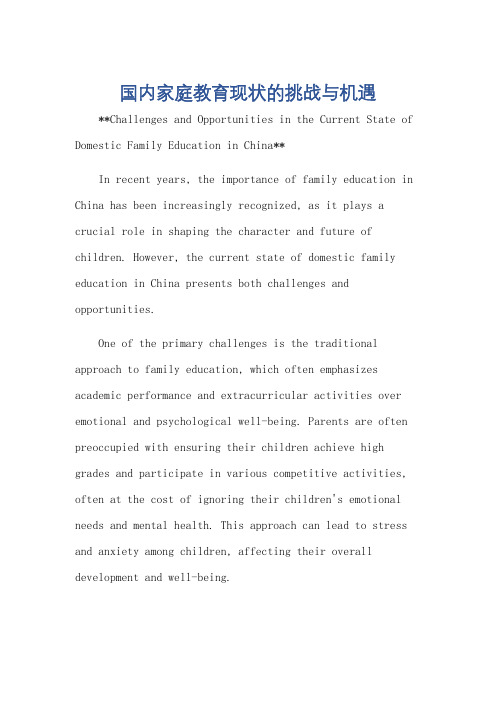
国内家庭教育现状的挑战与机遇**Challenges and Opportunities in the Current State of Domestic Family Education in China**In recent years, the importance of family education in China has been increasingly recognized, as it plays a crucial role in shaping the character and future of children. However, the current state of domestic family education in China presents both challenges and opportunities.One of the primary challenges is the traditional approach to family education, which often emphasizes academic performance and extracurricular activities over emotional and psychological well-being. Parents are often preoccupied with ensuring their children achieve high grades and participate in various competitive activities, often at the cost of ignoring their children's emotional needs and mental health. This approach can lead to stress and anxiety among children, affecting their overall development and well-being.Another challenge is the lack of consistent and comprehensive family education guidance. While there is a growing awareness of the importance of family education, many parents lack the knowledge and skills necessary to effectively educate their children. They often struggle to find reliable resources and guidance, leaving them feeling overwhelmed and uncertain about how to proceed.Despite these challenges, there are also numerous opportunities for improvement in domestic family education in China. Firstly, there is a growing emphasis on comprehensive development, which recognizes the importance of emotional, psychological, and social well-being alongside academic performance. This shift in focus provides an opportunity for parents to reevaluate their approach to family education and prioritize theirchildren's overall development.Secondly, there is an increasing availability of family education resources and guidance. Many organizations and experts are now dedicated to providing parents with the knowledge and skills they need to effectively educate their children. This includes workshops, seminars, and onlineresources that provide practical advice and strategies for successful family education.Moreover, the rise of technology and social media presents new opportunities for family education. Parentscan now access a wealth of information and resources online, enabling them to stay updated with the latest trends and practices in family education. Additionally, technology can facilitate better communication and interaction between parents and children, promoting a more open and understanding relationship.In conclusion, the current state of domestic family education in China presents both challenges and opportunities. While traditional approaches and the lack of comprehensive guidance remain obstacles, the emphasis on comprehensive development, availability of resources, and the rise of technology provide new avenues for improvement. It is crucial for parents to recognize these opportunities and take proactive steps to ensure that their children receive a balanced and nurturing family education that supports their overall development and well-being.**国内家庭教育现状的挑战与机遇**近年来,中国家庭教育的重要性日益受到认可,因为它在塑造孩子的性格和未来方面起着至关重要的作用。
国内家庭教育现状英语作文
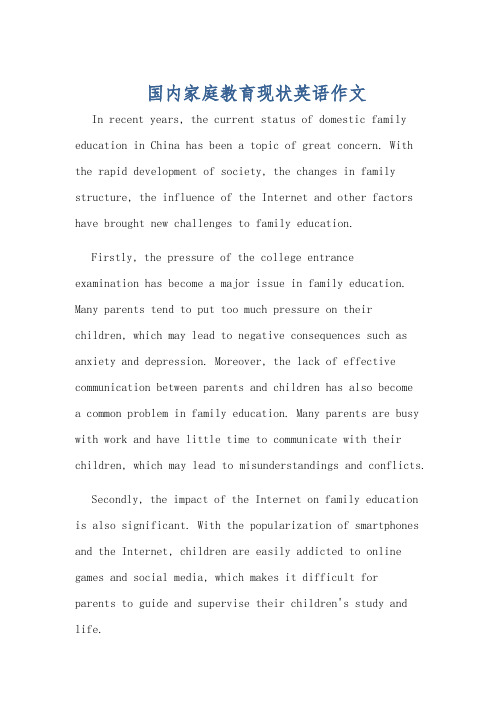
国内家庭教育现状英语作文In recent years, the current status of domestic family education in China has been a topic of great concern. With the rapid development of society, the changes in family structure, the influence of the Internet and other factors have brought new challenges to family education.Firstly, the pressure of the college entranceexamination has become a major issue in family education. Many parents tend to put too much pressure on their children, which may lead to negative consequences such as anxiety and depression. Moreover, the lack of effective communication between parents and children has also becomea common problem in family education. Many parents are busy with work and have little time to communicate with their children, which may lead to misunderstandings and conflicts.Secondly, the impact of the Internet on family education is also significant. With the popularization of smartphones and the Internet, children are easily addicted to online games and social media, which makes it difficult forparents to guide and supervise their children's study and life.In order to improve the current situation of domestic family education, it is necessary to pay attention to the following aspects. Firstly, parents should pay moreattention to the mental health of their children andprovide them with a relaxed and comfortable study environment. Secondly, parents should communicate more with their children, listen to their thoughts and feelings, and guide them in a positive way.In conclusion, the current status of domestic family education in China is facing various challenges. It is important for parents to pay more attention to the mental health of their children and communicate with themeffectively in order to improve the current situation of family education.最近几年,中国国内家庭教育的现状成为了人们非常关注的话题。
关于中国父母教育的英语作文

关于中国父母教育的英语作文Here is an English essay on the topic of Chinese parental education, with a word count of over 1000 words.Chinese parents are renowned for their dedication and commitment to their children's education. The traditional Chinese culture places a strong emphasis on academic achievement, and this has shaped the parenting styles of many Chinese families. Chinese parents often adopt a more authoritative approach to child-rearing, with high expectations and strict discipline. While this approach has its critics, it has also produced some of the world's top-performing students.One of the defining features of Chinese parental education is the importance placed on academic success. Chinese parents often see their child's academic performance as a reflection of their own parenting skills, and they are willing to go to great lengths to ensure their children excel in school. This can include enrolling their children in intensive tutoring programs, enforcing strict study schedules, and even relocating the family to areas with better educational resources.Another key aspect of Chinese parental education is the emphasis on discipline and obedience. Chinese parents often expect their childrento follow strict rules and guidelines, and they are not afraid to use punishment or harsh criticism to enforce these expectations. This approach is rooted in the Confucian philosophy, which emphasizes the importance of hierarchy and social order. Chinese parents see it as their duty to mold their children into well-behaved and high-achieving individuals who will bring honor to the family.Despite the strict and demanding nature of Chinese parental education, many children of Chinese parents report feeling a deep sense of love and support from their families. Chinese parents often make significant sacrifices to ensure their children's success, and they are deeply invested in their children's well-being. This can include providing emotional support, offering practical assistance with homework and extracurricular activities, and even delaying their own retirement to help their children financially.One of the key benefits of Chinese parental education is the emphasis on hard work and perseverance. Chinese parents often instill in their children a strong work ethic and a belief that success is the result of sustained effort and dedication. This approach has been credited with producing some of the world's top-performing students, who are able to excel in academic and professional settings.However, the Chinese parental education model is not without its critics. Some argue that the intense focus on academic achievementcan be detrimental to a child's overall well-being, leading to high levels of stress and anxiety. There are also concerns that the strict disciplinary approach can stifle a child's creativity and independent thinking, and that it may not adequately prepare them for the demands of the modern, globalized world.Despite these criticisms, the Chinese parental education model remains influential and widely admired around the world. Many parents in other countries have sought to emulate the success of Chinese parents by adopting similar strategies, such as emphasizing academic achievement, enforcing strict discipline, and providing intensive support and guidance.In conclusion, Chinese parental education is a complex and multifaceted phenomenon that reflects the deep-rooted cultural values and traditions of Chinese society. While it has its critics, the Chinese parental education model has also produced some of the world's top-performing students and has influenced parenting approaches in many other countries. Ultimately, the success of this approach depends on striking a careful balance between high expectations, strict discipline, and a genuine concern for the child's overall well-being and personal growth.。
国内家庭教育现状英语作文
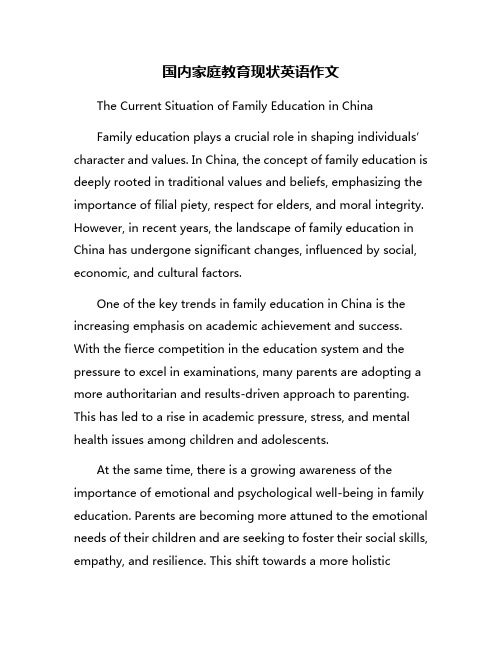
国内家庭教育现状英语作文The Current Situation of Family Education in ChinaFamily education plays a crucial role in shaping individuals’ character and values. In China, the concept of family education is deeply rooted in traditional values and beliefs, emphasizing the importance of filial piety, respect for elders, and moral integrity. However, in recent years, the landscape of family education in China has undergone significant changes, influenced by social, economic, and cultural factors.One of the key trends in family education in China is the increasing emphasis on academic achievement and success. With the fierce competition in the education system and the pressure to excel in examinations, many parents are adopting a more authoritarian and results-driven approach to parenting. This has led to a rise in academic pressure, stress, and mental health issues among children and adolescents.At the same time, there is a growing awareness of the importance of emotional and psychological well-being in family education. Parents are becoming more attuned to the emotional needs of their children and are seeking to foster their social skills, empathy, and resilience. This shift towards a more holisticapproach to education reflects a broader understanding of the factors that contribute to a child’s overall development.Another significant development in family education in China is the increasing influence of technology. With the proliferation of smartphones, social media, and online platforms, parents are faced with new challenges in managing screen time, promoting digital literacy, and ensuring the safety of their children online. The impact of technology on family dynamics, communication, and the parent-child relationship is a topic of increasing concern and debate.In addition, the changing family structure in China, characterized by smaller family sizes, dual-income households, and an aging population, has also had profound implications for family education. Grandparents, who traditionally played a central role in child-rearing, are now less available to provide support and guidance. This has led to a shift in the responsibilities and challenges faced by parents in raising their children.Despite these challenges, family education in China continues to be valued as a cornerstone of moral and ethical development. The importance of family bonds, cultural values, and traditions remains strong, providing a sense of stability andcontinuity in a rapidly changing society. As the landscape of family education in China evolves, it is essential for parents, educators, and policymakers to collaborate and adapt to the changing needs and aspirations of the younger generation.In conclusion, the current situation of family education in China is characterized by a complex interplay of traditional values, modern pressures, technological advancements, and changing family dynamics. While challenges exist, there are also opportunities for innovation, dialogue, and collaboration to ensure that family education continues to nurture the intellectual, emotional, and moral growth of children in China. By recognizing and addressing these challenges, we can strive towards a future where family education in China is inclusive, supportive, and empowering for all members of society.。
谈中美家庭教育的差异,反思我国的家庭教育

教学争鸣新课程NEW CURRICULUM谈中美家庭教育的差异,反思我国的家庭教育刘红娇(陕西延安延安大学)摘要:家庭教育是人类最原始、最真诚,也是最持久的教育。
儿童的思想、行为、习惯都能反映出父母的影子。
重视家庭教育方式,更好地促进孩子可持续发展。
关键词:差异;家庭教育;平等观念一、中美家庭教育的差异不同的生活背景,所产生的家庭教育方式也是不相同的。
家庭教育是人出生之后所接受的最原始的教育,同时也是影响儿童最深的教育方式。
(一)培养目标的差异中国有句俗语,“望子成龙,望女成凤。
”中国式的家庭教育方式更注重把孩子培养成“才”,在孩子身上寄予很高的期望,甚至还将自己没有实现的愿望一并加在孩子身上。
孩子的学习成绩是摆在第一位的,忽视培养孩子的独立、分享孩子的快乐、适应生存的能力。
但问题是到底什么是“才”?上一所好大学,毕业之后顺利签约一份好工作,有着丰厚的报酬?这是值得我们每一个人深思的。
孩子在这样的家庭教育方式下,他(她)快乐吗?他(她)真的可以成才吗?其实恰恰相反,美国家庭教育的目标是“望子成人”,与孩子平等地相处,把“成人”放到第一位。
培养孩子的独立性、与他人相处之道、发现生活的美以此来更好地生活,成为自己想成为的人。
(二)家庭教育内容的差异中国家庭教育是学校教育的延伸,教育内容更注重知识的累积、智力的开发,把读书放在第一位。
每一个孩子都被培养成了应试的机器,应试能力强、动手能力弱,强调认知能力的培养,忽视孩子的动手操作能力且不注重孩子社会能力的培养。
美国家庭教育不光是注重智力的提升,同时也更注重培养孩子适应社会能力和独立生存的能力,让孩子全方位地发展。
(三)家庭教育方式的差异中国的大多数家庭认为严格管教可以更好地促进孩子的成才。
提倡封闭式的家庭教育,父母与孩子之间缺乏平等性,更不要说以朋友的关系相处,父母比孩子地位更高一等,一直强调的是孩子尊重父母,忽视父母尊重、理解孩子。
美国的家庭教育提倡开放式的家庭教育,不仅把孩子当作“儿童”来对待,也把孩子当作“成人”来对待,以朋友的方式和孩子相处,理解和尊重儿童,给予孩子更多的是支持,而不是训斥。
中国家庭教育的古今对比

中国家庭教育的古今对比Family education_ Chinese partChapter 1: Chinese ancient family educationChinese ancient family education was an important part in family life, and it was taken seriously by ancient people. With a long history, Chinese ancient family education had developed to a system which has deeply influenced Chinese people until now.The purposes of Chinese ancient family education:A. The most important goal of Chinese ancient family education is its political function of maintaining stability of society and consolidating as well as inheriting the social morality which was the cultural support of feudalism. In the Great Learning(《大学》), the doctrine of cultivating themselves, putting family in order, administering a country and making the world peace(修身齐家治国平天下)had connected family education with country administration, which was welcomed and wide spread by ancient governments, and it used to be the goal and ambition of uncounted ancient people. Besides, feudalism was built on the basic of small-scale peasant economy(小农经济). The stability of family is the key of small-scale peasant economy. Therefore, the concept of ancient family education aimed at uniting the family and keeping it stable.B. The second purpose of Chinese ancient family education is moral education. It was wide accepted that to cultivate a person with noble character was much more important than to cultivate a person with profound knowledge.The features of Chinese ancient family education:A. Top-down model. In ancient times, patriarch and elders were the center of a family. Family education was conducted bypatriarch. It was a absolutely top-down model that children had no autonomous right.B. Filial-piety-centered ethics and morals education. The virtue of filial and piety is the core value in ancient society from imperial family to ordinary family.C. Prefer boys to girls. It was also a deep-rooted stereotype in the ancients. Boys had a superior social position than girls, and more opportunities in all aspects of life. Some familiar skills are descended to boys only.D. Pay great attention to children’s childhood education. The ancients believed that what person the children going to become can be seen in their childhood, so childhood education was quite important for parents.The methods of Chinese ancient family education:A. It was a process of step by step. In our country, the step by step teaching method can be dated back to the Western Zhou Dynasty. In the Book of Rites, people had recorded how to teach children in their different ages.B. Set an example for children. Chinese ancient family education was a process of unconscious influence. Parents taught their children by doing, always the skills.C. Different families had different family precepts. Except the virtue of filial and piety, there were no prescriptive learning content. Therefore, parents depended on how to teach their children and what to teach, which is called family precepts.The content of Chinese ancient family education:A. Moral character education. Instead of the knowledge, moral character education received more attention, as it was the first thing children learning, and it would last for their lifetime.B. Living skills and practice. Most of the ancient children werenot only studying. They had to help parents to do some housework, and learned living skills at the same time. In ancient times, the knowledge is very practical, so children could learn by practicing.The influence of Chinese ancient family education:A. Positive effect:Family education had become an important part in Chinese ancient education. Though family education, our national virtues can be inherited. Some education concepts are still very useful until now. In ancient times, it had made contributions to maintain the stability of society.B. Negative effect:It is no denying the fact that family education as a tool of feudalism has many pedantic concepts. It had killed the children’s natural instincts, neglected female’s right, and so on.Chapter 2: Chinese Modern family educationWith the development of society, family education had also changed a lot. New social environment had put forward new challenges to family education. The purposes of Chinese ancient family education:Compared with ancient family education, modern family education is much more realistic. Parents have a high expectation for their children not for the national need, but for children’s future. In nowadays society, a per son’s educational background connects with his social position. If a person is well educated, he is more possible to have a decent job and thus have a relatively higher social position, and is respected by others.The features of Chinese ancient family education:A. Nowadays, most of the families have only one child. This phenomenon has caused many educational and social problems.It is reported that the only child has become the center of family, and most of them have been spoiled.It is totally different from the ancient modal which reaches a totally different result that had aroused great debate around the country.B. Knowledge-based pedagogy has replaced moral education. In present time, when we refer to education, we are talking about the knowledge taught in school. The storage of knowledge now is the main measurement of a person’s educational level. Moral education has been greatly ignored compared to ancient time, and it is only taught in kindergartens and primary schools. Therefore, moral problems have increased relatively.C. Some functions of family education have been replaced by school education. As the knowledge increased dramatically, parents’ educational ability are of varying quality. They cannot teach their children systematically and comprehensively. Therefore, children need to be taught by professional teachers. Thus, school education gradually becomes the major part in educational system. Children spend more time with their schoolmates. However, most of the parents hence neglect the importance of family education, and over depend on the school education, which also become a serious problem in society.D. The problem of extremely imbalanced distribution of educational resources is also very severe. In remote areas, the children have no professional teachers to teach them, no advanced educational equipment, even no safe schools. However, in cities, especially in key schools, the students have excellent teachers, colorful school life, and beautiful school. These differences have determined their different fates to a great extent.The problem is vivid reflection of the great gap between the rich and the poor in china society.E. Children have great pressure than before. As we have mentioned, most families have only child, so parents have higher expectations for their children. Children could be sent to various after-school classes and so-called interest classes to study. Many educators have pointed out that the psychology to have great ambitions for their children is putting too much pressure to children and is destroying their childhood.The methods of Chinese ancient family education:A. Teach children through words rather than actions. Parents, especially in cities, have less time to company with their children, hoping that school can finish the work of teaching their children.The content of Chinese ancient family education:A. In the document of government, there are five elements to measure a student’s quality——virtue, intelligence, health, aesthetic and labor. However, once the students go into the schools, intelligence becomes the dominant element above all. It is why many children have high scores but low capacity.The influence of Chinese ancient family education:A. positive effect:In present day, people have multiple choices for their education according to their interests. Various careers have provided children many possible ways to go. Compared to ancient times, parents pay more attention to children’s education. Pedantic education concepts have been abandoned, and advanced concepts have been welcomed.B. negative effect:However, problems are also severe in present days. Children still controlled by parents. Besides, they have shoulderedoverweight pressure and parents high expectations in young age. The excessive attention to intelligence makes children develop imbalanced. Parents over depend on school education causing the deficiency of family education. Parents tend to spoil the only child making children develop bad hobbies. The imbalanced distribution of educational resources has deprived the right from the students living in remote areas. Many social problems can attribute to the deficiency of moral education.。
中西方家庭教育对比
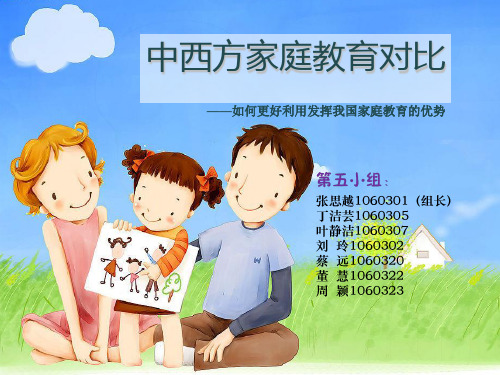
——如何更好利用发挥我国家庭教育的优势
Hale Waihona Puke S中国家庭教育是在教人的修养和价值理念优于美国。 中国家庭教育很重视伦理教育和孝道,在《论语》上 孔子曾经说过一句话,他说一个君子啊,要修身养性, 完成他这一生的成长,基本上要分这么三个大的阶段: 第一个阶段叫入则孝,出则悌,也就是说传统的孝悌 之义,一个人进了家里能够孝敬父母,出了家门能够 友善兄弟。第二个就是人在社会上,叫做谨而信,泛 爱众,而亲仁。谨而信,一个人态度要谨慎,言语上 不能太冒犯,不能太狂妄,而要笃诚守信。泛爱众, 广泛的博爱大众,对大家有这么一种善意。而亲仁, 再去亲近那些仁义的道理。
西方家长认为,应该尽量尊重孩子的个性, 鼓励他们追求自己的真是情感,并提供一个 宽松的环境。东方家长则认为,保护孩子最 好的方式是:帮助他们尽早为未来作打算、 培养好的学习和工作习惯,帮助他们树立来 自内在的信心。
两种理念都有各自的土壤,然而,蔡美儿 用自己的故事告诉中国父母,以正确积极的 东方式教育,辅以适当的技巧和鉴定的信念, 东方式教育在西方的土壤上也能开出成功的 花朵,让西方人为之敬佩。
蔡美儿 (Amy Chua) 1962年(虎年)生于美国, 现任耶鲁大学法学院终身教授。她以自己的育儿 经验写有一本书自传体性质的书《Battle Hymn of the Tiger Mother》(《虎妈妈的战歌》,又 译《虎妈战歌》)。
该书介绍了她如何以中国式教育方法管教两个 女儿,她骂女儿垃圾、要求每科成绩拿A、不准看 电视、琴练不好就不准吃饭等。书中的教育观点 涉及到了“圈养”和“放养”孩子的讨论,蔡美 儿以自己的亲身经历诉说了其中的苦与乐、失与 得。
普遍来讲,中国人重视教育这个主要体现在智育 和德育上。美国相对来讲有的重视的是体育与动手能 力。
高中英语作文:家庭教育FamilyEducation

1.现今⽗母⾮常重视家庭教育。
2.家庭教育的忧劣势。
3.你的看法。
Parents in China are paying more attention to the training of their only-child than ever before. Now, many children in cities have family tutors and more and more children have to learn a lot before they go to school. This is mainly because parents want their children to become somebody or to live better when they grow up. In addition, one-child families have more money and energy than before to afford family training.中国的⽗母都⽐以往更多关注他们的独⽣⼦⼥的教育,现在,许多城市的孩⼦有家庭教师,越来越多的孩⼦上学之前就必须学会很多。
这主要是因为⽗母希望他们的孩⼦成为什么⼈或当他们长⼤时⽣活得更好。
此外,独⽣⼦⼥家庭拥有⽐以前的有负担家庭教育更多的⾦钱和精⼒。
Family education has both advantages and disadvantages. The main advantage is that children can learn much and develop certain kinds of ability as early as possible, which may lead them to success or make them superior in knowledge to other children. The disadvantage lies in two aspects. One is that too much family education may cause the children to lose their own interest in studying. The other is that children will have less time to play or to do their own favorite things. This may be harmful to the shaping of children's characters.家庭教育既有优点和缺点。
关于中美家庭教育的差异商务英语毕业论文

中国某某某某学校学生毕业设计(论文)题目:关于中美家庭教育的差异姓名: 0000000班级、学号: 0000000000000系 (部) :经济管理系专业:商务英语指导教师: 0000000开题时间: 2009-4-10完成时间: 2009-10-292009 年 10月 29 日目录课题关于中美家庭教育的差异一、课题(论文)提纲二、内容摘要二、参考文献An Analysis of the Differences of Family Education BetweenChina and America000000摘要:年轻一代是民族的希望,家庭教育是培养孩子的基础。
中国家庭教育和美国家庭教育是世界上两种主要的家庭教育观念,同时它们都显示了自己的独特之处。
它们在家庭教育观念,教育方式,和教育结果上都存在着极大的差异.在美国的家庭教育里,父母更加注重孩子能力和人格的培养与塑造,而在中国父母相对传统,更加注重自己的主观想法,这篇文章将重点讨论在培养孩子的创造能力,兴趣爱好,独立性和其价值观上的差异。
通过比较这两种家庭教育来找到一种更好的教育方式,获得一些有益的启示。
关键词:家庭教育;差异;培养;能力IntroductionEducation is the key to development of talents .Family education is not only an important component of education but also the first lesson to a child which will be remember forever. Family education has a direct influence on the qualities of talents.Nowdays international competition is becoming fierce ,and it is a competition for the talents fundamentally. so ,every country should pay more attention to family education in the education projects.However, there are many problems in our education concepts even from education system. Maybe some people usually think schools and teachers should be responsible for these problems which appeared in education in recent years .If schools and teachers are to be blamed ,but their parents are more to be blamed .In order to find a more scientific way to educate our children .We should learn other countries experiences ,Eventhough they are all kinds of family education in the world ,but American family education is the most famous one .So it is necessary to make a comparison of the differences of family education between American and China.This thesis is to comparing American family education and Chinese education superficially, which may offer some good suggestions to family education.1. Two Concepts of Family Education1.1. American Family EducationIn America, parents' aims are to train their children to have the ability of adapting to environmental variety and the ability of living independently. Based on this concept, most American parents emphasize more to train their children's ability of independence once they are born. They generally believe that children's growth must rely on their own experiences, because they think that children should form a self-supporting will and the capacity to live independently since their childhood. And the capacity comes from the training in the early age. Theso-called training contains many aspects, such as work, temper will, patience, the spirit of hard work, etc. However, the most fundamental training is the ability of adapting to hard conditions. Through the process of work, children will form the labor sense, learn some work skills and form a habit of labor. Besides, children can learn how to overcome difficulties, temper their willpower, develop their talents and skills, rich their knowledge, and form a habit of hard work and thrifty by working in hard conditions. It is just in the unconsciously process that children will obtain the independent survivability and take the responsibilities for the society.1.2. Chinese Family EducationCompared with American, Chinese parents have a very different concept of children's education. Some parents in China only care about whether the children have a promising future, a good job, a good life or not. Based on these expectations, the majority of parents feel that their responsibility for their children is to create as good conditions as possible they can so that the children will not worry about anything in the future.2. Two Different Ways of Family Education2.1. Differences in Cultivation of Children's IndependenceBecause of a fundamental difference on parental concept, there are two completely different ways on cultivating their own children's independence.First and foremost, Chinese family education and American family education vary in the attitude towards independence. Most American parents think that the child is an independent individual since he is born, who has his own will and characteristic. Neither the parents nor teachers have priorities to determine and restrict their children's behaviors. The Declaration of Independence says: “All thepeople are born equally; they are endowed with holy rights including life, freedom and pursuit of happiness." In order to let the children recognize that they are the masters of themselves, American parents will give their children enough freedom and will not make decisions for them in most cases. American parents are willing to respect and understand their children's feelings, thus, they always think carefully about their words and choose the appropriate time to educate their children. The famous basketball star, Michael Jordan once said, “I admit that our children will inherit some good traditions, but I don't think we should make rules to teach them what they can do, because I think even if they do, they will not be happy. His words may represent the thoughts and attitude of most American people in family education.In order to cultivate the children's ability to enjoy independent life, American parents take the measures as follows. Firstly, they try to give them enough opportunities and conditions which allow them to be fully trained in various settings since they were born. The common way the parents used is to let the children do some self-service work according to children's ability in different ages, because this method will develop their children's love of working and talents. Forexample, “There are three children, which are primary school students, in an American family. All of them have their own roles and abilities. The10 year -old boy helped his father to mow, water flowers and clean court; the 8-year-old little girl can weave cup mat in various colors.” This is the result of practices from their childhood. It is not an isolated phenomenon in America. This kind of examples, such as primary and middle school students doing part-time job, are too numerous to cite. According to the America Newspaper Stands Selling Federation's convey, there are thousands of newsboys in America. The phenomenon of elder students working in society can be seen here and there, and they are supported by their parents. An American said: “parents should encourage their children to work and earn money in their free time, this will save some expenses, and more importantly, it will develop children's self-awareness at an early age.” Children will understand the meaning of treasure and know that treasure can only be gained through working, and then, they will know why we should cultivate saving and other good habits.Secondly, American parents would like to see their children experience all kinds of difficulties rather than to live inan over- comfortable environment. They pay great attention to train their children's mental ability so that the children can face all kinds of setbacks and can survive hard circumstances. So, we can see the following example, in a cold winter morning, the American children get up to deliver newspapers while our children are still sleeping in the warm blanket. Many Chinese parents probably think that it is unacceptable, or even think that is “cruel” to children. Thirdly, American parents have requirements and regulations on children's pocket money, although their economic conditions are better than the majority of Chinese families. How much money they should give their children as pocket money depends on children's ages and actual demands and the income of the family. What American parents do is to cultivate children's awareness of frugality. Moreover, they do not award their children by giving them pocket money, and they let their children understand that the purpose of study is to help them to become a valuable person in the future. According to a survey, it is found that “About 54 percent young students have no pocket money in America, and there are fewer chances to get money from their parents as their ages increase. It is also found that 68 percent Americanstudents earn pocket money through doing part-time job in their spare time.. Rockefeller was one of the richest men in the United States and the first man earned one billion dollars in the world, but his children have little pocket money according to the regulations which printed on the title page in his family book. “The pocket money of the 7-8years old children is 30 cents per week; that of the 11-12years old children is one dollar per week; that of the over 12 years old is three dollars per week. The most important thing is that the children were asked to record every expenditure. If the account is clear and their expenditure is used for legitimate purpose, they will receive additional 5 cents in the next week. Rockefeller said: ‘Too much wealth will bring disaster to their generation.' ”His words contains a profound philosophy, it is worth of thinking carefully.2.2Differences in the Cultivation of Children's InterestsIn the United States, children are encouraged and induced to develop their interest and do the things what they are interested in. American parents will not prevent their children from doing what they like to do, and they will not enforce their children to do what they do not like either. For instance, Jefferson, a fifteen-year-old child of a common family, likes toplay basketball, "I wanted to make him become a lawyer, but he became interested in playing ball when he was young. We don't like him to give up his study, but after a long talk with him, I felt that he had his own idea of life, perhaps he should become independent, and so I gave up my mind.” His father said. Maybe at the beginning the parents have requirements for their children, but at last their own choices are the most important, in United States.But in China, many parents never consider or respect their children's interests. Because of historical and traditional reason, almost everyone thinks that scholars should be respected without any doubts and have high status in the society. So they pay great attention on their children's studies because they believe that knowledge can change ones fate. In fact, scholars are respected by people in most time. Hence, the parents hope that their children can obtain the same honor like the scholars in the future. Without thinking carefully and researching, we can conclude from practices in daily life that some Chinese parents, if not many, have been strangling their children's interests in a way that is elusive to American. To be concrete, under the current Chinese family education, most children are arranged with assorted extracurricular classeswhere they are taught to learn playing piano, drawing, singing, etc., partly because parents wish their children to develop in all-round way and have a head-start in studies than other children. The fact, however, is that children may show the least interest in these classes that seem dull and boring in their minds. In this way, children are deprived of the freedom to dip into things what they are interested in and children are bereft of ebullience and creativity in studying. We also can find that Chinese parents do not care about children's interests from a survey. According to the survey made by Women's Federation of Tangshan Municipal, in Hebei province, we find that “About 10 percents parents absolutely agree that everything is not important if their children study well. And most parents agree this view thoroughly. There is only 27 percents of parents do not think so. As for the other opinions, that the children have a healthy body and a good spirit is more important than study well, only 5 percents of parents agree with it completely, but there are more than 32 percents of parents said they don't agree with it completely.”All of these reflect that most Chinese parents are more concern about children's study than their interests. In otherwords, most Chinese parents do not care about their children's interest.2.3 Differences in the cultivation of children’s valueIn china our parents hope their children become a rich man or a great man ,when they grow up .In their opinion these people regarded as the symbol of success and can win respect from others so during the process of their children’s growth they always require their children do the things that may beyond their ability or against their dream. So many children are eager to be attend top university and neglect their origin ideas .However American parents always respect their children own ideas ,no matter whoever he or she will be in thefuture ,they usually hope their children can live freely .they don’t concered about whether their children future would be but offer the best environment for their children to live independently and can face various challenges2.4 Differences in Cultivation of Children's CreativityAs for cultivating children's creativity, there are also great differences between China and America. American parents encourage their children to innovate and surpass their predecessors in all fields. They think that children, like adults, have the independent ability of study, and they hold a tolerantattitude to their children's creativity. They encourage children to explore and provide very different views on some problems and let children solve these problems through their own efforts. Even if children cannot get a positive effect, the parents would not to interfere their children's work; instead, they would let their children to aware of the problems gradually in the process of developing and then correct their faults by themselvesimitate others. They always hold a negative attitude on children's exploration activities, and these activities are always stopped by their parents. For example, the children who demolished an alarm clock in the United States families will not be blamed by their parents. Sometimes, they will work with their children to repair the clock when the children cannot do it. They will even encourage children to demolish the clock again and reinstall it. But, if the same things happened in Chinese families there would nobody dares to tell their parents what they did even though they have installed it back. The children's creativity is usually ruined by their parents' strict supervision in the early age3. Two kinds of family education resulted in different fruitsFor the sake of the concept and way of family education are different .So it shows some obvious differences. Americanschool do not teach reading writing and mathics ,but rather skills such as persistence concentration and their ability functions as a member of group.There is diversity in American family education. Some parents have specific aims such as earlymusical training or potential development.Thus their ability of independence is very strong,they don’t need to depend on their family from 18 years old .They usually do some part –time jobs to supply their daily life expense,and then they are very familiar with market.When they are young ,they begin to mange the finance, which let themeselves deeply understand that it is not easy to earn money and also have the ability to earn extra money,Except the abilities above they have the ability adapting to social environment because they have experienced the life through their work .They can get along well with others and face difficulties calmly with people around them .They always have the enough confidence and courage of being independent as a member of the society.These valuable qualities are closely related to their family education.It is estimated that half of the Nobel prize winner are form America of each year .On the contary ,Only a few Chinese people get it . Although we have enough kidswho can get a high score in school,although their schoolwork is better than that of American students.In china many parents are willing to do everything for their children ,only they can get a high score in school, because teenagers in china strongly rely on other people and are passive in doing things .By analyzing the different family education we do find which kind of education is better . ConclusionIt is very obvious that the future of a nation depends on the quality of young people, and family education can't be substituted by other forms of education.According to our country's special circumstances, the number of one-child family is becoming larger, so family education must be combined with school education .Therefore, it is necessary to change traditional family ideas. First, parents should educate their children in social environment, in other words, they should not only teach their children the knowledge of survival, but also the responsibilities for the society. Secondly, they must cultivate their children's consciousness of independence, self-support, cooperation and the spirit of caring for others. And requires parents, especially the families with one child, to completely change the wrong ways which they used in thepast. Therefore, much can be learned from the ways of family education in United States.参考文献:[1]里克纳 .美国家庭教育[M].海南出版社. 2004.[2]海姆.G吉诺特.孩子把你的手给我[M].京华出版社.2004.[3] 陈鹤琴.家庭教育[M].华东师范大学出版社.2004.[4] 高芸香.我的家庭课堂:培养出三位英美博士的中国母亲谈家庭教育[M]. 中国人民大学出版社. 2006.。
- 1、下载文档前请自行甄别文档内容的完整性,平台不提供额外的编辑、内容补充、找答案等附加服务。
- 2、"仅部分预览"的文档,不可在线预览部分如存在完整性等问题,可反馈申请退款(可完整预览的文档不适用该条件!)。
- 3、如文档侵犯您的权益,请联系客服反馈,我们会尽快为您处理(人工客服工作时间:9:00-18:30)。
To solve these problems is a big project.
We have a long way to go!
精品课件
Thank You!
精品课件
nd wrong activities leading
精品课件
One-child families become more and
more
Parents'busy work
Chinese educational system
Chinese traditional idea
Not all parents'personal qualities
精品课件
精品课件
Chinese Family Education
精品课件
精品课件
• Family • parents
• society)
→ the first school → the first teacher
Family first place
the
first unit
精品课件
The Significance of Family Education
Family education is very important in students' development and it is not only the basis, extension and supplement of elementary education, but also is of irreplaceable special role and meaning for schools and social education.
精品课件
However,many Chinese parents neglect the importance of family education and use wrong ways to educate children.
精品课件
精品课件
The Problems Existing in Chinese Family Education
• Indulgent type of family education • Careless type of family education • Utopian expectation of children's educa
tion • Bringing up by elder generation • Parents' mistake in conception of value a
are high enough
...
精品课件
➢School education should be more comprehensive ➢Reform the educational system ➢Parents'self improvement ➢Learn from American family education ➢Resort to law
